In Kenya, the Maasai of Narok and the Marachi of Busia have several idiosyncrasies in common. First is their love for cattle. They keep large herds of cattle. When you travel within the Marachi-land of Busia you will be excused to think that you are in Maasai-land because picturesque resemblance of the local breed of cattle they keep in large numbers.
The Maasai, like the Marachi, are also traditional craftsmen. However, unlike the Maasai whose handicraft consists of beard-work and is practiced mainly by women; the Marachi traditional craft is practiced by men. The Marachi handcraft is based on weaving and furniture manufacturing. Their furniture is so unique that it is a brand by itself even without the modern brand naming and labelling.
Among the furniture and products from Marachi is the unique item, the sofa set, which is so attractive every homeowner who has seen it would love to have it in their house. In some parts of the world, this kind of item would be a collector’s item gracing the lounges and verandas of prominent homes and high-class hotels.
In search of this attractive item, we arrive at Bumala, 50km from Busia town on the Kisumu-Busia-Uganda highway. Bumala is the heart of Marachi sofa set production. To the South-West, Bumala is graced by beautiful conical-shaped hills behind which we are told lies the land of the Samia, cousins to the Marachi people.
Our inquiry about the origins of Marachi sofa sets had begun at Eldoret, a cosmopolitan city-to-be on the Western ledge of the Great Rift Valley. For many decades, this urban center has been main the display center and largest market for sofa sets emanating from Marachi. At Eldoret, the vendors were directed to the towns of Bumala and Sega. They told us they order their stock either by phone or travel there in person to replenish their stock. The sofa sets are delivered to Eldoret by buses that ply daily between Uasin Gishu County and Busia County.
To find the extent to which the Marachi sofa sets are distributed within the Western region of Kenya, we visit furniture showrooms in Kisumu city and Lwanda satellite town where everything that happens in Western Kenya is replicated on a smaller scale.
At Bumala, one does not need to be directed to the workshops of the Marachi furniture because it is the first thing you encounter when you arrive in this vibrant town. On the roadside towards the heart of the town is an assorted of products prominently displayed at their long-term showroom located on the side of the highway.
In one of the workshops, we met 24-year-old furniture expert weaver Pius Ochieng. He comes from Ng’ela village, a distance of Ksh 100 by Bodaboda motorcycle taxi. He is both a designer, carpenter, and weaver. He began playing his trade in Bumala in 2017 when his father passed away. He was forced to drop out of school in class seven to take over his father’s place of furniture workshop and help provide for their family. He says he had known his late father Fred Oloo as a furniture maker all his life.
“It was not difficult for me to learn the art of weaving because I had been assisting my dad in making furniture from the time I was a small boy. Furniture making is in our family.”
We are in luck as we find him just beginning the weaving process on the sofa whose skeleton is complete. So we can watch and see the real action of Marachi sofa-set making. Even as we talk he is beginning the finishing stage of the sofa he is working on. In the background music is blaring from a solar radio hanging from the ceiling which looks like a permanent feature in the workshop. His senior at the workshop is 40-year-old Stephen Makokha who says he has been in the business of making Marachi furniture for 20 years.
“This type of vocation is not only a learned trade”, he explains, “it is like a family loom.” The Marachi are traditionally hand-makers of household and trade products.
“It is in the Marachi blood; that is why it is called Marachi art.”
Various raw materials are used to make the furniture. The backbone material is sawed timber which is intwined and bound with flexible sticks called Zisoloho. Before they dry, Zisoloho is very flexible and, therefore can be bent and twisted into any shape. Which makes it a very good material for building frames for chairs, stools, and tables.
The other material used is a twine called Madoro. This is mainly sourced from the Sua River. The manufacturers have to spare a day or two to go and harvest Madoro. Harvesting involves uprooting the creepers, splitting, drying, and then twisting to shape. There are also ready-made Madoro sold by vendors at Sega who harvest and sell to furniture manufacturers. The raw materials are sold in rolls called ngatas at a price of Ksh. 1,000 each.
A two-seat sofa consumes two-and-half ngatas of Madoro and takes a day to weave.
A three-seat sofa consumes four ngatas of Madoro
A four-seat sofa consumes five ngatas of Madoro.
Other materials include cushions, various cover materials, and vanish.
There are three main centers for manufacturing Marachi sofa sets: Bumala, Sega, and on Busia Road to Uganda. During market day, on Saturdays, several freelance home-based producers bring their products for sale at Bumala market.
Pius is using his proceeds from the business to educate his siblings. Pius’s older partner Stephen Makokha is proud that his work has helped him develop his family economically; including building a house, paying dowry, and educating his children. He says previously, all craftsmen “fundis” made one form or design of sets. However, exposure to the internet has changed that. Due to this exposure to different furniture designs from different parties of the world, Marachi sofas have also modernized and adopted some new designs. Some customers also request custom-made designs with frames made of different materials including metal frames.
“We can handle all that with no sweat,” says Makokha, “just show us the design you want we will reproduce it using these materials”.
What many admirers of the Marachi sofa sets don’t know is that apart from the sofa sets, there is a large variety of products handmade in Marachi land. These include Marachi coffee tables, side shelves, stools, trays, wine bottle baskets, shopping baskets, and lampshades. They can make virtually any custom-made product if given a design.
Marachi sofas are so popular that customers come from Nairobi, Mombasa, and even Uganda. Besides what is displayed, the artisans produce orders for a hotel and homes. However, many of the customers are those who stop by and buy. The challenge they have is that they are not organized as a trading society so they cannot take advantage of their unique design to popularize their production. The other shortfall is they do not have a brand name or sticker indication of who the manufacturer is.
Finally, they lack a central shade on the road to make and display their products.
Pius Ochieng’s parting shot to all sundry: we make Marachi sofa sets, do you want one?



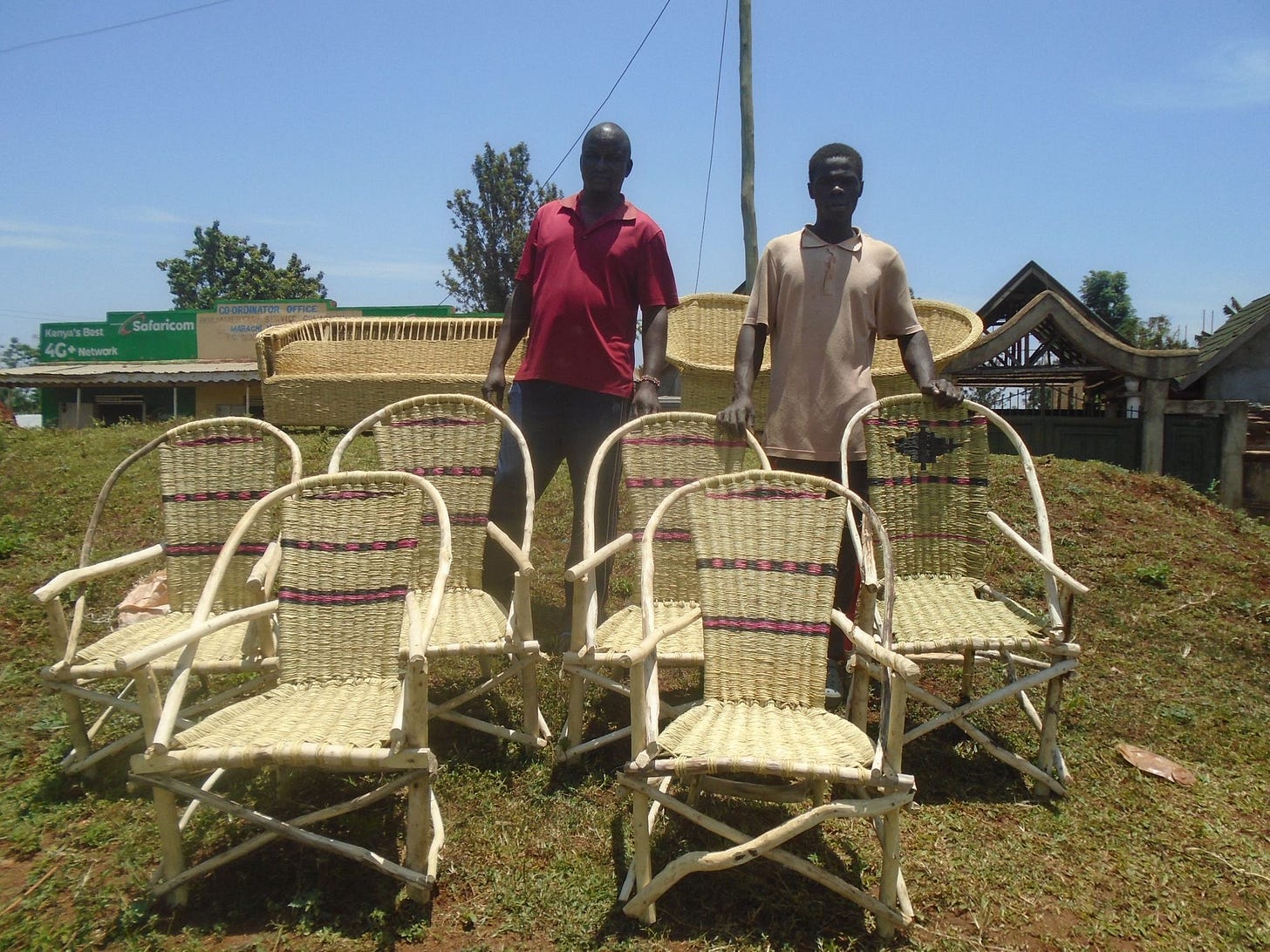
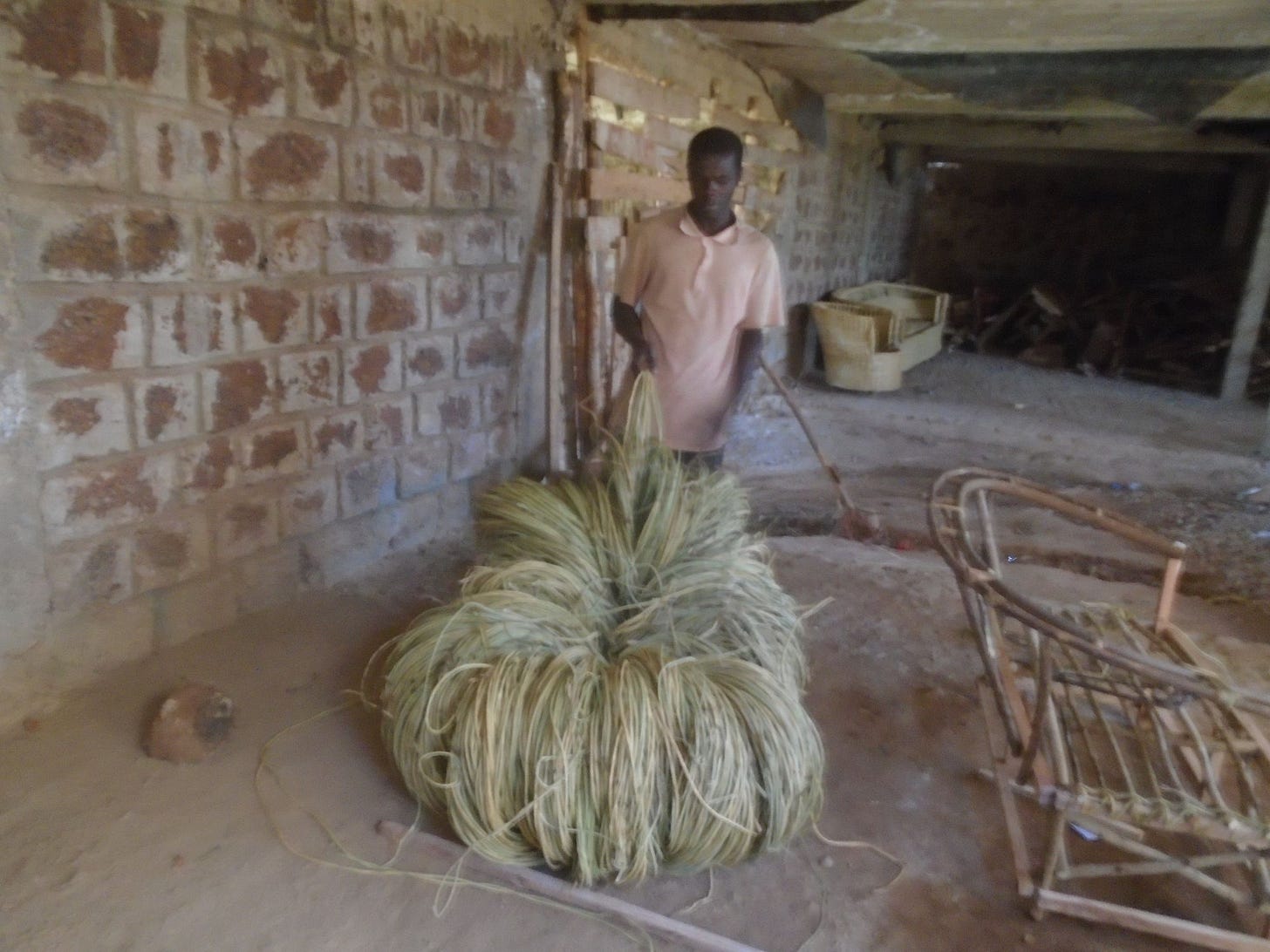
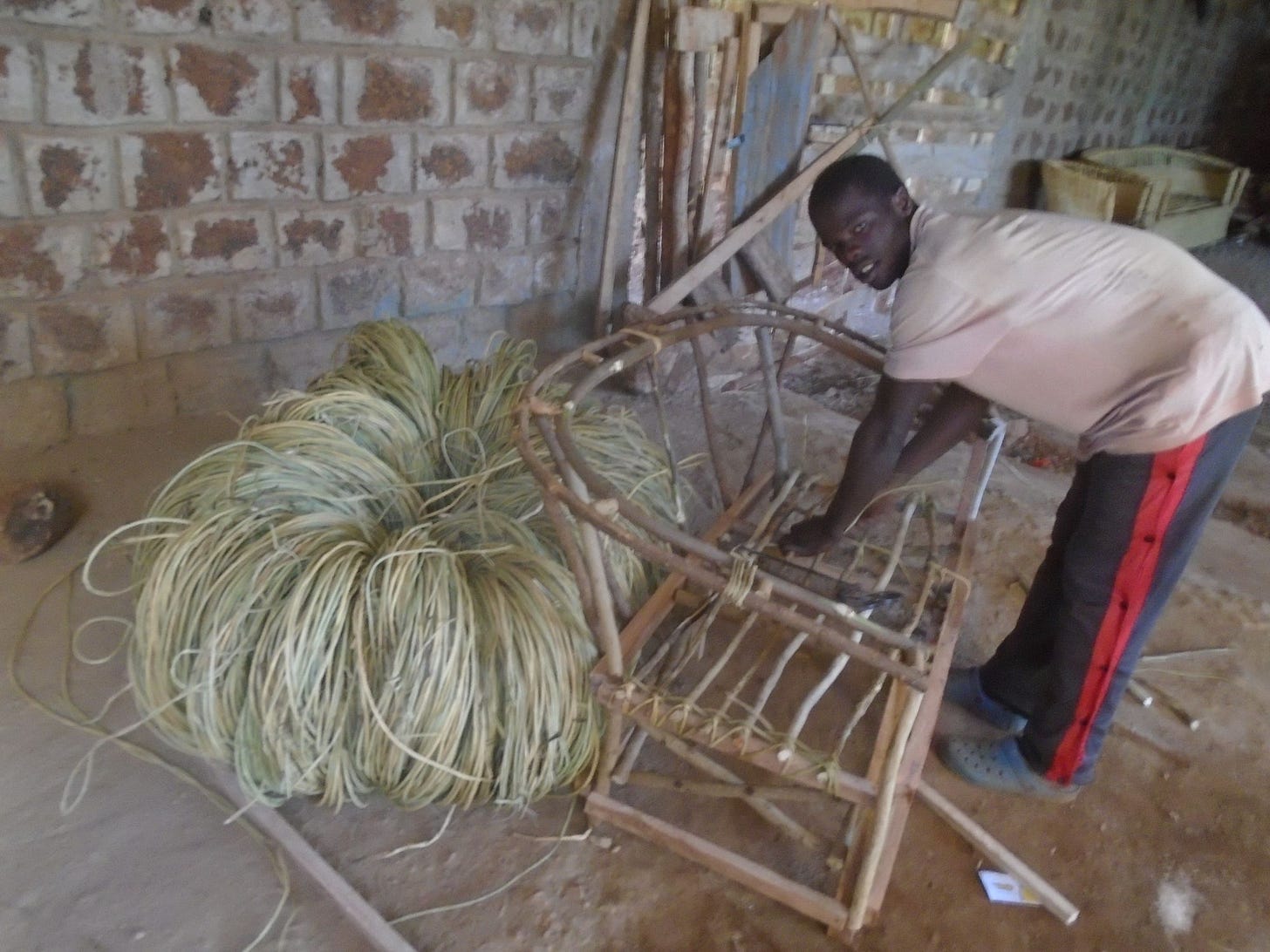

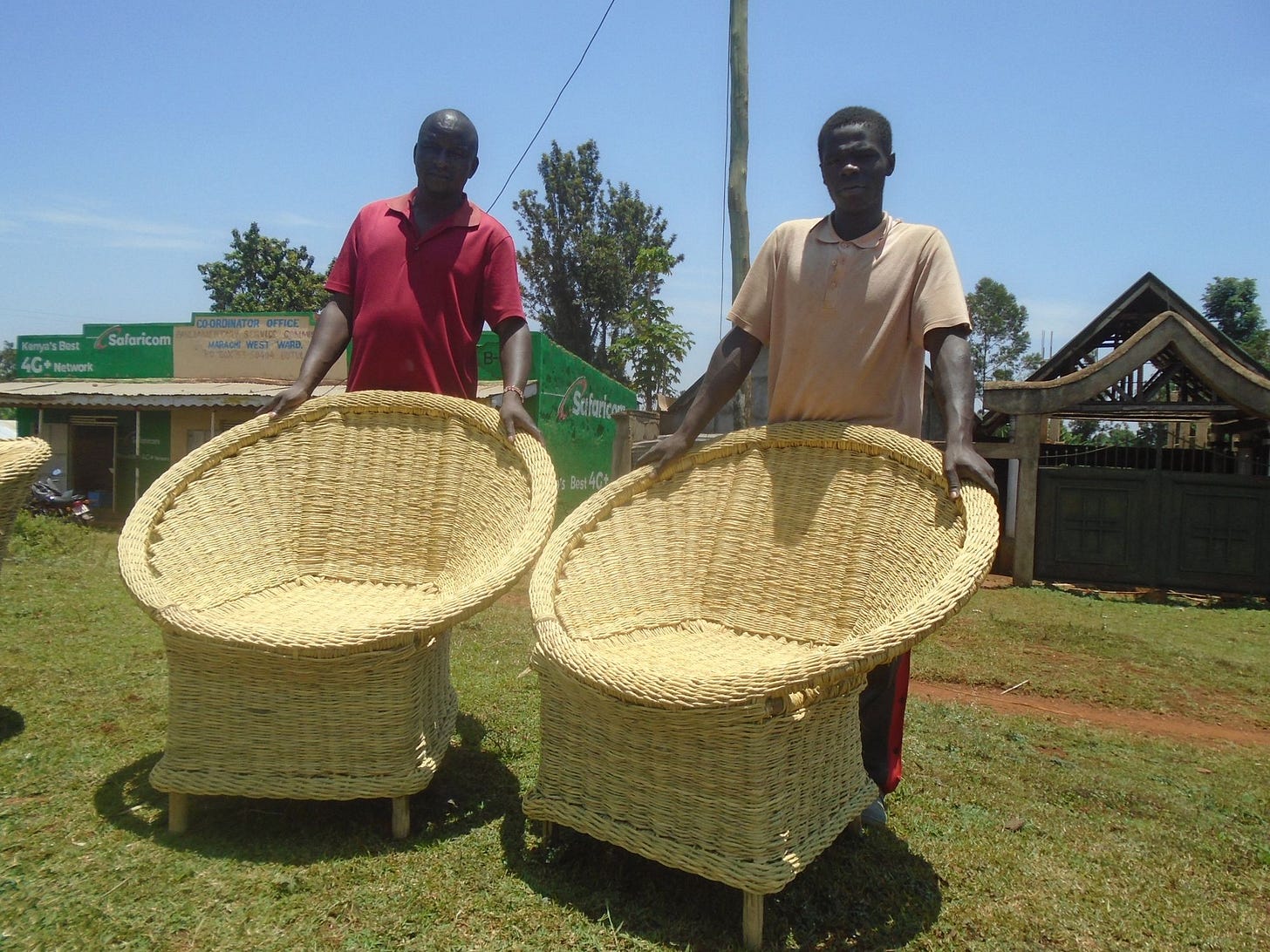

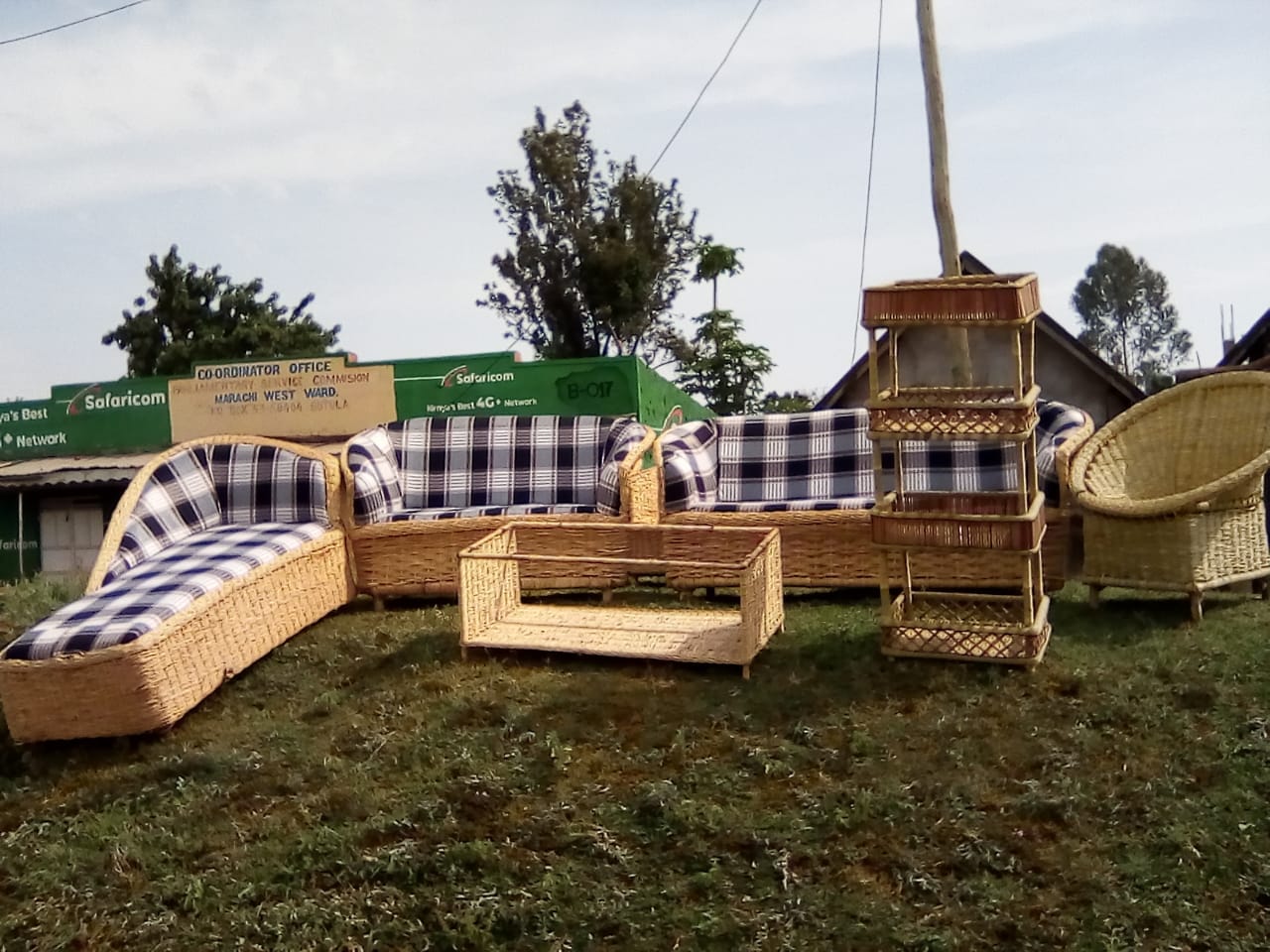
Hello , how do I support these gentleman buying their beautiful chairs . I am in Kampala Uganda . Reach me on WhatsApp +256 776 351 618
Hello, how can I purchase these chairs from these gentlemen